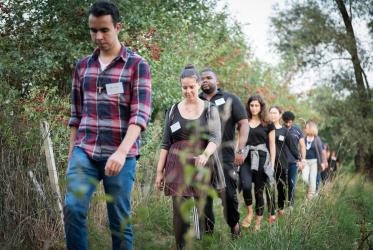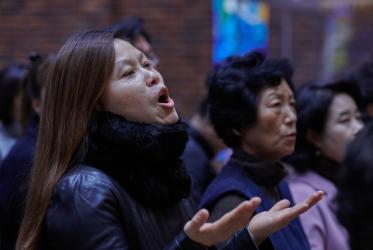*By Praxedis Bouwman
Hopes and aspirations for peace were expressed on 20 September at the Peace Palace in the Netherlands, site of a “Walk of Peace” held on the second day of the International Week of Peace. The event was organized by the Council of Churches in the Netherlands and PAX, a Dutch peace organization, in cooperation with local churches in The Hague.
The Walk of Peace was inspired by the vision of a “pilgrimage of justice and peace” – the core concept at the heart of a call issued by the 10th Assembly of the World Council of Churches (WCC) in Busan, Republic of Korea, in 2013.
Rev. Dr Hielke Wolters, associate general secretary of the World Council of Churches (WCC), delivered a speech at the end of the walk. He said: “This magnificent building [the historic Peace Palace] expresses a deep longing for peace. The Peace Palace was built on the great ideals of the 19th Century, before they were shattered by the harsh reality of the early 20th Century. The First World War broke out not long after the building was completed and officially opened.”
Wolters added: “In many conflict zones, people have lost hope for justice and peace. With this Walk of Peace, we are expressing our conviction that hope is a basic human right: The right to hope for peace in our streets, in our villages and in our cities. The right to hope for peace at work and in our families and among our friends. The right to hope for peace world-wide.”
Some five hundred people came to The Hague to walk the interactive stretch of six kilometres, passing through symbolic buildings such as the Mescidi Aksa Mosque; it was once a synagogue, as a plaque on the front shows. The Jewish letters seen in the entrances are followed and completed with a prayer in Arabic. Leaving the mosque, people brought the white roses to the monument for the Jewish children. Along the road, participants wrote messages on prayer flags, to either hang them on the gate of a church or to bring them to the endpoint, the garden of the Gemeentemuseum Den Haag.
Before entering the garden, the participants passed Binnenhof, the centre of Dutch democracy, where the first sentences of the constitution are carved in marble. This is where the first article defines the principle of equality and the ban on discrimination.
The walk closed with a picnic behind the sculpture of Nelson Mandela inspired by his autobiography “A long walk for peace”.
“A pilgrimage is a pathway towards the outside world, with awareness of peaceful societies and people in violent conflicts, as in Syria and Iraq,” writes Edwin Ruigrok of the peace organization Pax, in a booklet on pilgrimage. “At the same time it is an inner pathway towards our soul and the silence within ourselves. In the end, it is a road of change. We hope that this walk moves you somehow.” The booklet describes many “pilgrimage” activities and their organizers like the Humanists and UNICEF; the Salvation Army has provided soup and bread for the “pilgrims” on the road.
At the Peace Walk the participants were not only motivated by the activities, but they also experienced spontaneous encounters. This included hearing the story of a young Quaker who had stayed four weeks in the refugee camps in Calais, the place in France where refugees try to cross the Channel to the United Kingdom. Around his neck he wore a screw on a cord: “I have found it at the new fence the French are building: a second wall to prevent the refugees from going,” he said.
The director of PAX, Freek Landmeter, underlined in his closing speech that this Walk of Peace is “not an end-of-the-line”. He invited all participants to do even more in regard to peace, solidarity and justice.
*Praxedis Bouwman is a communicator from the Netherlands. She produced this feature article based on materials from the Council of Churches in the Netherlands and PAX.
Read full text of the speech by Hielke Wolters at the Walk of Peace
WCC Blog: Dutch pilgrims plead for peace at the Peace Palace in The Hague
News release from the Council of Churches in the Netherlands (in Dutch)





